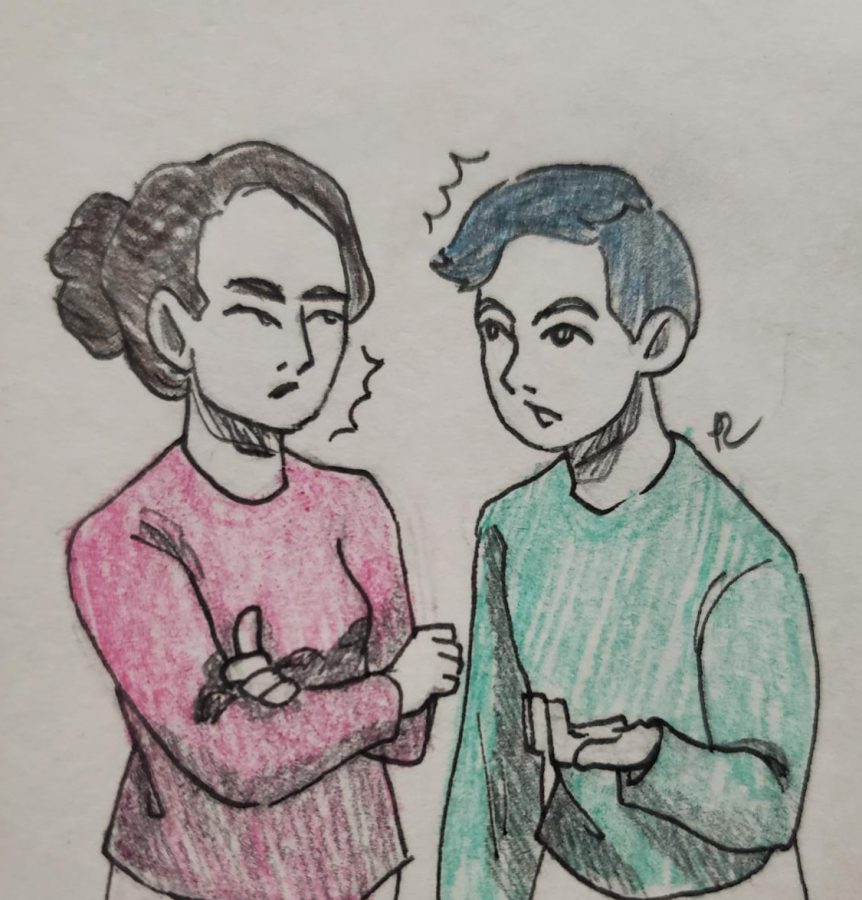Respect disregards political opinions
November 30, 2020
The political parties have been separated with issues and controversies into two categories: right and wrong. However, many things in life aren’t black and white; they are grey.
What often happens when one states an opinion that is not shared by others, instead of trying to understand their perspective, they are immediately attacked.
“The trend we’re seeing now is that if you don’t think the same way as someone else does, you are almost ridiculed for it rather than just owning that thought and owning your perspective and agreeing to disagree without the feeling that you have to hold it in because something might happen to you if you don’t,” Alyson Singer, counselor, said.
When some students discover that they have a difference in opinion with their family, they tend to keep it to themselves to make sure they won’t be looked down upon for having unique views.
“My family knows my opinion now, but I kept it from them for a while because I knew they wouldn’t like it and I knew my father, in particular, would hold it against me,” Jackie Wren, senior, said.
Students who don’t want their family to know about their viewpoint are typically worried about how they will react; that fear can change how a student handles the situations they are placed in.
“My mom didn’t really care that I had a different opinion because she isn’t very political; while my dad took it badly and any time we talk about politics he tells me I don’t know anything because of what side I’m on,” Emily Bernier, senior, said.
When students and parents argue over their opinion and what they believe to be right or wrong, parents may continue to push their opinions on their children because they believe they have more experience.
“It’s a double-edged sword in this situation because when we think about parents, they most likely feel that when they look back at when they were the same age and compared to the age they are now, they have learned and taken in so much information that may be their political viewpoints have changed,” Singer said.
When looking at a student’s perspective, they don’t have the same experiences as their parents, but they are growing with the new age and learning more to create their own opinions.
“However, when you get to high school and take economics and government classes and history classes and meeting new people and planning for college, now you’re breaking that mold and learning new things and questioning how you feel about certain topics,” Singer said.
Political opinions are rooted in one’s own personal beliefs. Even though some may feel that their counterparts hold hateful ideas, it’s recommended not to respond to hate with more hate because that only escalates the issue.
“My suggestion would be to deliver your passion and your thoughts in the same respectful manner, that you would want your thoughts to be received by someone else,” Singer said. ”Don’t go into it thinking, ‘my way is right, your way is wrong and what I say goes and your opinion doesn’t matter,’ because what’s going to happen is that the other person is going to feel the same way and it’s going to turn into a fight.”
When a fight breaks out, it tends to be hard for students to continue to push for what they believe in, because they feel as though they won’t be listened to.
“The only time there was an argument was when it was projected that Biden was president and my father couldn’t accept it. I knew I couldn’t change his mind, so I let him speak and walked away because he never listens,” Wren said.
While students learn new things as they grow as individuals, they try to educate others and try to keep them informed to allow them to create their own opinion.
“My sibling does question a lot of things and usually they would ask my parents questions, but afterward I always tell them the other side of the story because I don’t want them to follow our parents. I want them to make their own decisions and decide whether they think it’s good or bad,” Bernier said.
When a student feels silenced
“I feel that staying silent builds resentment because regardless of the topic, parents always teach their kids that they can go to them and talk to them about anything,” Singer said. ”So if a student feels a certain way about a topic, and they feel that they are safer if they don’t say anything about how they feel, it’s going to ruin not only the emotional connection, but it’s also going to reinforce the thought that how they feel doesn’t matter.”
During this time of political extremities and heated debates, it’s needed to figure out how as a country we can move forward if one side won’t even listen to the other side.
“Even take politics out of it, if you have a thought or a concern or are very bothered by something or are very passionate about something and you have to hold it in, it’s going to ruin the relationship,” Singer said.




